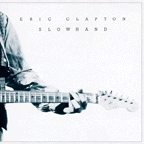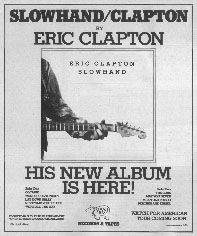![]()
  |

Slowhand
Eric Clapton
RSO 3030
Released: November 1977
Chart Peak: #2
Weeks Charted: 74
Certified Platinum: 3/14/78
 Eric Clapton's solo albums have tended to be so evenhanded and laconic that they often seem interchangeable. His pain was always so apparent that every move he made seemed frozen for enternity. At first glance, Slowhand does nothing to alter that pattern -- a few good tracks interspersed between the usual filler -- but there's a lot more going on here beneath the surface. Clapton is showing signs of psychic rehabilitation. His love songs are pointedly realistic. In a chilling moment of self-revelation called "Next Time You See Her," he focuses his long-subliminated anger at losing his lover. Perhaps most importantly, for the first time since leaving Cream he seems comfortable with his image as the hotshot guitarist, using his old Yardbirds nickname for the album title and flashing the old superstar form.
Eric Clapton's solo albums have tended to be so evenhanded and laconic that they often seem interchangeable. His pain was always so apparent that every move he made seemed frozen for enternity. At first glance, Slowhand does nothing to alter that pattern -- a few good tracks interspersed between the usual filler -- but there's a lot more going on here beneath the surface. Clapton is showing signs of psychic rehabilitation. His love songs are pointedly realistic. In a chilling moment of self-revelation called "Next Time You See Her," he focuses his long-subliminated anger at losing his lover. Perhaps most importantly, for the first time since leaving Cream he seems comfortable with his image as the hotshot guitarist, using his old Yardbirds nickname for the album title and flashing the old superstar form.
The pyrotechnics are mostly restricted to a long (8:42) jam, "The Core." The band (Dick Sims on keyboards, Jamie Oldaker on drums, bassist Carl Radle and guitarist George Terry) rolls into a boogie rhythm reminiscent of Derek and the Dominoes. Mel Collins blows a searing, double-tracked soprano sax break, and Eric takes off on a lightning solo that sounds more like his classic run on "Crossroads" than anything he's done since. Glyn Johns' production is superb -- the guitar/drums relationship is crisp and authoritative, powerhouse Clapton caught in a glimpse of white hot frenzy.
 Click image for larger view. |
- John Swenson, Rolling Stone, 12-29-77.
Bonus Reviews!
- Noel Coppage, Stereo Review, 5/78.
The legendary guitarist has mellowed here in favor of some tasty blues-flavored ballads. There are occasions where Clapton lets loose with some impeccable guitar solos, yet the tempo is on a subdued tone on the whole. Clapton's mainstay band comprised of keyboardist Dick Sims, bassist Carl Radle, guitarist George Terry, drummer Jaime Oldaker and saxophonist Mel Collins provide both the mellow and stinging instrumental support while background vocalists Yvonne Elliman and Marcy Levy aid Clapton with harmonies. The ballads are among Clapton's more sensitive as is his playing. Best cuts: "Wonderful Tonight," "Peaches And Diesel," "The Core," "Lay Down Sally," "Cocaine."
- Billboard, 1977.
As MOR singles go, "Lay Down Sally" is a relief -- at least it has some soul. But the album leaves the juiciest solos to George Terry, and where four years ago Eric was turning into a singer -- in the manner of Pete Townshend -- now he sounds like he's blown his voice. Doing what, I wonder. C+
- Robert Christgau, Christgau's Record Guide, 1981.
With its concentration of hits it would be easy to mistake Slowhand for a "Best of..." compilation. The centrepiece however is an extended track, aptly named "The Core"; Clapton also records a Don Williams C&W track, J.J. Cale's "Cocaine" and John Martyn's folksy "May You Never."
The Glyn Johns production features Clapton's chopping and clucking guitar style well though there is a dullness and compressed quality in some of the tracks which in places make this album come off worse in comparison with the earlier 461 Ocean Blvd. Sleeve notes are poor.
- David Prakel, Rock 'n' Roll on Compact Disc, 1987.
After a spell of tepid albums, Clapton made a comeback with a recording that strongly recalls 461 Ocean Boulevard. Certain influences became more pronounced (a country feel on "Lay Down Sally" and the cover of J.J. Cale's "Cocaine"), the blues sound heartfelt, and the guitar sounds as if it had taken a shot of adrenaline. One of his best efforts. * * * *
- Stephen Thomas Erlewine , The All-Music Guide to Rock, 1995.
One of the best of of Clapton's mellow-period albums. * * * 1/2
- Alan Paul, Musichound Rock: The Essential Album Guide, 1996.
On this platinum-selling disc, the guitar god delivers an eclectic group of songs that go from blues to country to straight-up rock, including the soft "Lay Down Sally," the anthem for the time, J.J. Cale's "Cocaine" and that wedding mainstay "Wonderful Tonight." This classic is the pinnacle of laid-back '70s. A handful advise: ignore the words and enjoy the mastery of his instrument -- his music says so much more than what he is singing. * * * * *
- Zagat Survey Music Guide - 1,000 Top Albums of All Time, 2003.
Slowhand was the nickname given to Clapton by the Yardbirds. On the quintessential Seventies album, he mixes candlelit love songs and guitar-hero riffs; "Cocaine" and "Wonderful Tonight" are the hits, but don't overlook "Next Time You See Her," a tender melody loaded with a death threat to a lover's suitor.
Slowhand was chosen as the 325th greatest album of all time by the editors of Rolling Stone magazine in Dec. 2003.
- Rolling Stone, 12/11/03.
Eric Clapton's transformation from a God-like Sixties guitar hero to a man at ease in the world of adult contemporary radio took shape on Slowhand, which found him and his band in a relaxed frame of mind.
Teaming up for the first time with producer Glyn Johns, whose past production and engineering credits had included The Beatles, The Rolling Stones and The Who, the 1977 release was also a somewhat eclectic affair, absorbing blues, country and mainstream rock.
Clapton's subdued approach is no more evident here than on "Wonderful Tonight," the first song he had prepared for the album and another tribute, after "Layla," to his future with wife Patti Boyd -- who divorced from the Beatle George Harrison that year. Though quickly becoming a radio and slow-dance favourite, "Wonderful Tonight" only provided ammunition for the critics to accuse him of setting for lightweight, bland material.
But the album's opening cover of J.J. Cale's bluesy "Cocaine" set the right tone, while Slowhand's tempo is taken up on the country-rock "Lay Down Sally," which became his biggest US hit since the chart-topping "I Shot The Sheriff" when it reached Number Three at the end of 1977. This track's success was also key to turning the album into Clapton's biggest seller to that point, with only Saturday Night Fever preventing it from taking the Number One position, in the UK it managed Number 23.
As of 2004, Slowhand was the #69 best-selling album of the 70s.
- Hamish Champ, The 100 Best-Selling Albums of the 70s, 2004.
![]() Reader's Comments
Reader's Comments
No comments so far, be the first to comment.